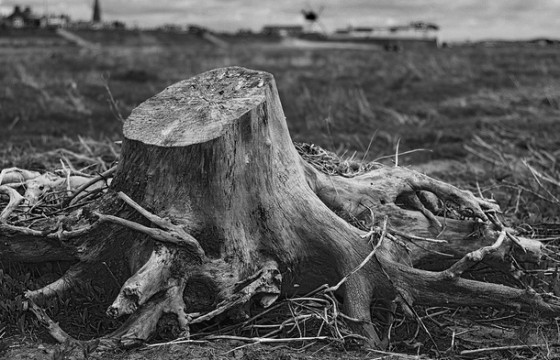
The Mayor of Omer insists that Bedouins are behind the felling of thousands of trees on disputed lands.
Every so often we are put in the unfortunate position of having to weigh our environmental concerns against socio-political issues. A while ago, we wrote about Palestinian architect Omar Yousef whose philosophy and style are based on necessity borne out of injustice. And frequently, innocent bystanders suffer most from war, such as these innovators who eventually lost their creative designs as a result of oppressive decisions from their leaders.
This recent story from the Jerusalem Post similarly creates conflict for us; we at Green Prophet are the ultimate tree-lovers: trees are carbon sinks, they provide shade, nutrition, and spiritual sustenance. It’s hard to quantify the many benefits of trees. As such, the loss of thousands of Mesquite, Acacia, and Eucalyptus trees in Israel’s Negev Desert is a serious blow for everyone. But it is also an interesting tool of protest for the Bedouins who are suspected of killing them.
1948
Before 1948, the Bedouins were the only inhabitants of the unfriendly Negev desert and agriculture in the region did not come easily. However, once the State of Israel was created, several waves of settlers moved there. While most of the Negev towns remain among the country’s poorest, this is not true of Omer, Lehavim, or Meitar.
Many of the country’s top executives and researchees, as well as seniors of both the civil and military sector of societies live in these three towns, according to the non for profit Adva Center. Combined, they are among the top ten in terms of the country’s average salary.
The Bedouin, who are viewed as the weaker element of society, fall on the opposite end of the earning spectrum. To date, many of their villages are considered “unrecognized” and therefore the State refuses to provide basic infrastructural services, and as recently as this past Ramadan, the Al-Arakib village was razed even though many of its inhabitants were observing their holy month.
With this backdrop in mind it is hard to criticize the Bedouin, if indeed they are the perpetrators of this unfortunate activity, for cutting down trees on land they perceive to be their own. Nor does the Mayor of Oren attempt to disguise his hostility toward the Bedouin.
The hostile Badash
“I’d hate to be the ones who did this when I get my hands on them,” Badash told The Jerusalem Post in a phone interview. “For those who don’t realize it, there is a war going on in the desert.”
“Over the last few years the JNF has planted more than 4,000 dunam (990 acres) of new trees in the area. We refuse to give them up. For every tree that is cut down, we will plant 10 more. We will protect the forests from any further harm. We will put in surveillance equipment. We will put sentinels in the forest. This is an existential war and we refuse to surrender!” Badash said.
For this same issue, Bedouin protests have turned violent: last year, according to JP, one worker was injured and 20 arrests made.
However, this pales in comparison to the 150,000 or so Bedouin in the desert who are increasingly marginalized by the State’s plan to develop the Negev. According to Adva, the Negev 2015 development plan fails to address the issue of land or “unrecognized” localities, rather favoring an influx of a “stronger” population.
Protest
Given their general poverty, it is therefore unsurprising that the Bedouin have resorted to chopping down trees that the JNF has planted. It is a form of protest such that we’ve never really seen before. We’ve seen treehugging and rallies and strikes. We’ve seen occupations, critical mass, and even top-free, but we don’t often hear of tree-cutting.
A political protest is designed to draw attention to what the public consider a matter of extreme importance: we protest against our leaders who fail to adequately mitigate climate change, and we protest war. According to JP, not long before this incident in the Negev, activists put up posters on the JNF building in Tel Aviv in order to protest what they perceive as unfair treatment towards Arabs and Bedouins.
However, it is devastating that our natural commodities must suffer as a result of inequitable political policies.
“According to Dani Gigi, JNF’s regional director for the Negev and the Arava, the damage done to the forest was severe by any measure,” JP wrote.
“Putting up a security system in the forest is unrealistic. Fortification is not the answer. The solution has to come from education and law enforcement. It is important to note that the battle here is not with the JNF. We are just here as contractors fulfilling the government’s policies,” Gigi said.
If Mayor Badash and the JNF are genuinely concerned about these trees, they would do well to give the Bedouin a fair chance at expressing their complaints; education works both ways.
More travel and nature news from the Middle East:
Climbing God’s Mountain in Sinai
Lebanon’s Five Biggest Environmental Headaches
Daridere Resort and Camping Area a New Turkish Eco Tourist Spot
Image via andyhaye




There were a few additional reasons for planting trees in Israel…Some of them brought on a negative effect on the ecology of the region. In the Hula Valley, trees were planted to drain the swamps. The Eucalyptus tree, a native to Australia, has too much of a thirst for our region. Draining the swamps was an ecological catastrophe, leading to the establishment of the Society for the Protection of Nature in Israel.
In other places, planting trees was a clever way to hide the destroyed Palestinian village that once existed in the pre-Israeli state.
I lived and worked in Omer for a year. One would never know that there was a water shortage in the country judging from the green grass, and the tree lined streets they have.
I, too, am too tired to get into an argument about the disparities between the Bedouin community, and the most wealthy of our society. But as I see it, it’s better to have a tree felled than a person killed. If this is a way to draw attention to their desperate situation, than let it be.
And I love trees probably more than the average Joe…
Thanks for this article and tackling such a sensitive issue.
Arwa
great article Tafline. A very well-balanced piece. I pray that one day the Government & State of Israel will both support all its residents, including the non-Jewish ones, and support the land that the State is founded on. You’d hope the 2 would go hand in hand…….
Hi Ariel:
Any kind of sweeping statement should be checked, so yes, I agree. Also, I think that the Hebrew language and culture demonstrate how Israelis are in general quite rooted to nature, something I respect deeply.
I’m actually in Kenya at the moment so it’s funny you should site that particular story. I’m visiting Lake Naivasha where (among other things) the issues of overgrazing and deforestation are doing tremendous damage to one of few freshwater lakes in the country.
Just yesterday there was a “pumice-slide” from an Austrian-owned flower farm that is terrible for the lake. I went to investigate and one of the things I learned is that the surrounding hills – overgrazed, etc. – became that way after the Western inhabitants arrived. It turns out the locals exploited an opportunity to supply an expanded demand for meat.
That industry subsequently exploded.
I suspect one (general) difference is that the western world tends to exploit resources on an unsustainable, large-scale commercial basis, whereas the locals, also in general, exploit resources for subsistence.
However, as you say, population expansion IS a serious problem in Africa and the Middle East. Look at Egypt!
Ah well… we’ll save the world yet.
Thanks Ariel.
Tafline,
Though I stand by my original comment, I apologize about the harsh tone. I wrote it late at night and short of patience. I certainly realize that you approach these issues in good faith.
If I may, I’d like to add another point.
I think that while it is generally true, that the western world has imperiled the world’s environment, it would be a mistake to think that the non-western poor people of the world or the traditionally existing inhabitants (not all of whom are “poor”, of course) of the world have not been a cause of very serious environmental damage. I think that it is problematic to create an ideological framework to interpret the world, particularly in this regard.
For instance, Israel is certainly, by and large, a modern western state. Most certainly, it has its share of environmental problems, and like almost every other state in the world, is far from perfect in dealing with these issue. On the other hand, Israel is the only country in the world to have a net increase of trees at the end of the 21st century. This is because there had been, from the very founding of the state, a strong program against desertification. This has lead to the purposeful planting of hundreds of thousands, if not millions of tress and multiple forests, where non existed before. This has been done to fight the expanding desertification that many countries experience in the arid climate of the Middle East and North Africa. On the other hand, and this is just one example, there are poor farmers in Kenya who are settling forest lands that are major water sources for rivers and which sustain the migratory wildebeest herds. Their farming activity, which involves cutting down trees in forests, has seriously jeopardized the local ecology: http://news.bbc.co.uk/2/hi/8057316.stm Also, unsustainable herding practices, related to increasing population size, is also a cause for desertification (it is one thing for a sparse traditional herders to have their goats graze the land, and quite another when their numbers are large (I am not a proponent of limiting population growth, but this is a fact). Anyway, I’m just pointing to the notion that these are not issues that fall neatly into an ideological framework. The “West”, indeed has nothing to do with what’s going on with Kenya, but Western tourist money is probably a serious factor in encouraging the Government of Kenya to save the forests and the Mara river and save the Wildebeest.
Thank you for your comments, Ariel. I realize it’s a complicated and sensitive issue.
Comparing Israel to the United States is a bit tricky considering that country wiped out almost every single Native American tribe and relegated the survivors to some of the most uninhabitable parts of the country.
Nonetheless, from an environmental point of view, we’ve seen that the western world’s culture has seriously imperiled the planet and marginalized its poorest inhabitants.
Hopefully we will eventually embrace a friendlier, more wholesome way to coexist and repair what damage we can.
Article’s conclusion born of absolute ignorance about what’s happening in the Negev desert. The Bedouin destroyed the forest as an expression of their desire to squat state land with impunity. Bedouin are poor because of their extremely high birthrates, widespread polygamy, lack of emphasis on education, and the general incompatibility of their culture with the western world. This article’s viewpoint, which also ignores the fact that the Bedouin are overwhelmingly responsible for most thefts happening in Southern Israel, is just completely biased. Simply put, you can’t blame Israel for the social problems that both the Bedouin and the Israelis are facing because of a backward Bedouin culture. If they existed in the United States, the same problems would exist– except that no sane State government in the United States would allow people to illegally squat land– as Israel does permissively and widely– the vast majority of Bedouin live on illegally occupied land. They are also not indigenous to the area– they are Muslims Arabs and their origin is in the Arabian Peninsula, not Israel, of which the Jews are the only extant population which is indigenous to it (except for the tiny 700 member Samaritan community).
The writer of this article should first get educated before attempting to reason something they know nothing about.